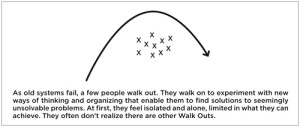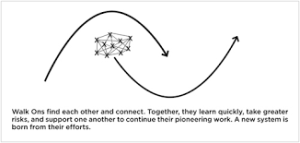I’ve recently returned from a fantastic holiday in one of my favourite places – La Belle France. It was a wonderful time of relaxation, restoration, reconnection and reflection. My summer reading was the quite simply stunning book, “Walk Out, Walk On”, by Meg Wheatley and Deborah Frieze, recommended to me by Prof Stuart Eglin. It resonated with me, provoked, challenged, encouraged and envisioned me and I heartily recommend it as a MUST read, if you haven’t done so already.
It flows in the same stream as ‘The Art of Hosting’ and is refreshing in its style – one of learning, rather than teaching, an invitation instead of an instruction manual.
The basic premise of the book is this: many of the current systems we have, “are failing to create solutions to the very problems they were created to solve.” They have become large, over-organised, lumbering bureaucracies that stifle creativity and use people to support and uphold the structures, rather than releasing the people and supporting them to live and work more resiliently.
When we recognise that a system is failing, we can spend an enormous amount of time and energy trying to put sticky plasters on it, attempting to fix and repair what is there. Perhaps this is because we are afraid to let go, perhaps because we develop a kind of idolatry or sentimentality towards what was or we simply cannot imagine a different way of being. But there are pioneers who look for new alternatives and they fall into two types.
1) Some will look to create new alternatives within the structures and help the old transition into the new.
2) Others will create new alternatives outside of the old system and invite others to slowly join as they discover new ways.
Both pioneering types are vital – and share the same core DNA – they are ‘Walk Outs’. What is vital is that they don’t just walk out, but that they walk on to reimagine a different future. Walk Outs are not motivated by greed or power, but by love and kindness, recognising the damage caused by the current system and looking for an altogether better way.
Walk Outs can often feel quite isolated and alone, but once they begin to find each other, connection and community become key ingredients to finding the way forward.
This challenges our management school and well rehearsed ideas in western thought about how growth and change occurs within organisations and systems. We do not need to continually look for maximising growth and profit. There are alternative motivations and more sustainable futures than the ones we are currently choosing.
My personal focus in the next few blog posts will be to apply this to the NHS and healthcare at large. I will take each chapter in turn and draw out some of my learnings from the amazing communities around the world brought to life in this book to help reimagine what healthcare is for.


